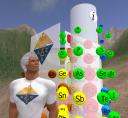When I was a kid, the highlight of the year was to watch cowboys take turns trying to stay on a bucking bull or bronco for at least eight seconds. It was a game of endurance, preparation and practice. Interviewing is not that different.
Each year my dad would take a long lunch break the last week in December to be one of the first in line to buy tickets for our family to attend the Sandhills Stock Show & Rodeo, the first stop on the Wrangler Pro Rodeo Tour for the Professional Rodeo Cowboy Association. Competition on the last night of the rodeo was fierce, and tickets sold out fast.
Inside the rodeo, bulls bred for muscle, girth, and bad attitude would grunt and writhe as cowboys attempted to climb onto their backs. As the gate to each chute opened the cowboy would be flung to and fro like a tassel at the end of a whip. His fate was decided in 8 seconds or less based on the amount of preparation and practice devoted to this moment.
On an interview, it is important to remember that being prepared is your best asset. Apply early and take the time to proof your application with great care. If you need to present a research talk, write it in advance and present it to a group of your lab mates, friends or family. Choose people who will ask critical questions that will help you hone your presentation and interview skills. Anticipate the questions that you are likely to receive from interviewers and formulate an answer for each. Through repeated presentation of your talk, your degree of comfort will increase, so you will appear more relaxed and more competent.
Research is an important part of your preparation for the interview. Check the annual reports and the long term, financial stability of the organization. Ask your host in advance for the names of your interviewers. Prepare for the interview by searching your interviewers publications; research; and any other details about their relation to the organization so you are well informed prior to your meeting. Sites like Linkedin.com may help you to map common interests and contacts. Your job during the interview will be to demonstrate what you can add to the organization. The more connections that you make, the stronger your chances of getting a job.
On the day of the interview, dress sharp. How you dress for the interview will be judged as a sign of respect, or a lack thereof.
During the interview, ensure that the banter is two-way. In bull riding, the cowboy can be disqualified if he falls off the bull, or if the bull refuses to buck and spin. The cowboy is responsible for spurring the bull into action as necessary. You should have a set of questions ready, so that you can pull the interviewer back into the conversation as needed. Any preparation that you have done regarding the interviewer or the company will come in handy.
If you are well prepared, the interview process should be a fun, learning experience. It will be one of the few times that you will have an opportunity to meet such a divergent group of people, as well as a rare opportunity to see and ask questions about the inside operations of a company and its people. Even if you don’t end up with a job offer, or decide not to take the job when offered, you will have learned about how the company works.
As in bull riding, it is the persistent and the prepared that prevail.
This article was written by David Harwell, Ph.D., assistant director of the ACS Department of Career Management & Development.



 Posted by D.S. Loney
Posted by D.S. Loney  Lussac Merlin in Second Life
Lussac Merlin in Second Life Finola Graves in Second Life
Finola Graves in Second Life  Hiro Sheridan standing in front of a 3-D Periodic Table
Hiro Sheridan standing in front of a 3-D Periodic Table Organic Chemistry class on Drexel Island
Organic Chemistry class on Drexel Island
